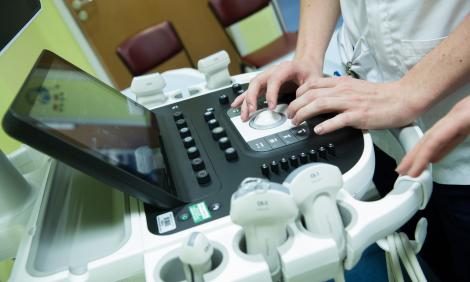Gastrointestinal physiology
Gastrointestinal physiology concerns any part of the digestive tract from the oesophagus to the anus and also of the liver, biliary tract and the pancreas.
As a healthcare scientist working in gastrointestinal (GI) physiology, you’ll specialise in the study of GI function and disease.
Working life
You’ll use various highly technical, mechanical and electronic instruments to measure various parameters within the digestive tract.
Working in GI physiology the parameters you'll be measuring will include:
- pressure
- pH
- impedance
- tone
You might also:
- use ultrasound of the anal canal and rectum
- undertake 'biofeedback' therapy with patients who have pelvic floor dysfunction
- treat patients with faecal and urinary incontinence using percutaneous tibial nerve neuromodulation (PTNS)
The results of all of these investigations will contribute to the care pathway of patients who may have primary swallowing disorders, severe gastro-oesophageal reflux disease or disorders of the gut function, notably faecal incontinence or constipation or both.
Depending on the diagnosis of these tests and measurements, patients will then be offered appropriate treatment which might include medication or surgery.
Who will I work with?
You’re likely to work in a team that includes gastroenterologists (doctors specialising in gastroenterology), colorectal surgeons, dietitians and specialist nurses.
Want to learn more?
-
Most jobs in the NHS are covered by the Agenda for Change (AfC) pay scales. This pay system covers all staff except doctors, dentists and the most senior managers. Trainee clinical scientists train at band 6 level, and qualified clinical scientists are generally appointed at band 7. With experience and further qualifications, including Higher Specialist Scientist Training, you could apply for posts up to band 9.
Staff will usually work a standard 37.5 hours per week. They may work a shift pattern.
Terms and conditions of service can vary for employers outside the NHS.
-
With further training or experience or both, you may be able to develop your career further and apply for vacancies in areas such as further specialisation, management, research, or teaching.
Healthcare science staff often work at the forefront of research and innovation, so that patients are continually receiving the very best healthcare. For example, in gastrointestinal physiology, you might be researching symptoms and causes of different types of reflux amongst patients.
-
Job market
In November 2018, there were 6,123 clinical scientists registered with the Health and Care Professions Council.
The NHS Scientist Training Programme (STP) and Higher Specialist Scientist Training (HSST) attract many more applicants than there are places and so there is considerable competition for places.
Finding and applying for jobs
When you’re looking for job or apprenticeship vacancies, there are a number of sources you can use, depending on the type of work you’re seeking.
Check vacancies carefully to be sure you can meet the requirements of the person specification before applying and to find out what the application process is. You may need to apply online or send a CV for example.
For the STP and HSST, there is an annual recruitment cycle and applications should be made through the National School of Healthcare Science's website, where you can also find information about the programmes and the recruitment process.
Vacancies in organisations delivering NHS healthcare can be found on the NHS Jobs website.
You may also find suitable vacancies in the health sector by contacting local employers directly and by searching in local newspapers.
Find out more about applications and interviews.
Volunteering is an excellent way of gaining experience (especially if you don’t have enough for a specific paid job you’re interested in) and also seeing whether you’re suited to a particular type of work. It’s also a great way to boost your confidence and you can give something back to the community.
-
For further information about a career in gastrointestinal physiology, please contact:
- Academy for Healthcare Science
- Association of Gastrointestinal Physiology (C/o British Society of Gastroenterology)
- Health and Care Professions Council
- National School of Healthcare Science





